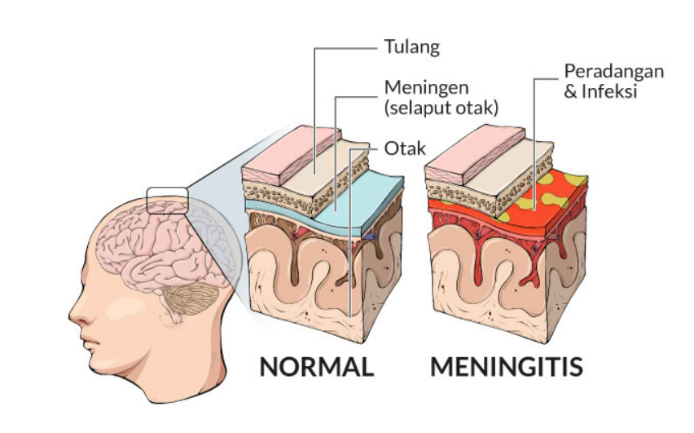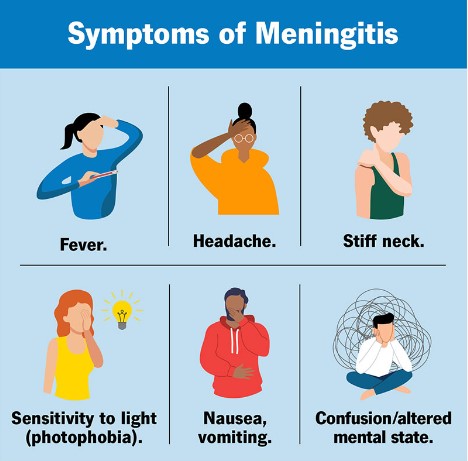
Meningitis is a serious inflammatory condition of the protective lining of the brain and spinal cord, usually caused by infection. If not treated promptly, this disease can be fatal. Unfortunately, early symptoms of meningitis are often not recognized or considered a minor problem, so appropriate treatment is often delayed.

This article will discuss in full the signs of meningitis that are often ignored and how to prevent them, so that you can be more alert and recognize them early.
Meningitis Symptoms That Are Often Ignored
Meningitis can cause symptoms that are often overlooked. However, recognizing the early signs is crucial to getting the right treatment and preventing serious complications. Some of these symptoms include:
1. Severe Headache
A very severe headache, especially if it is considered the "worst headache ever," can be an early sign of meningitis. Other symptoms, such as fever and stiff neck, often accompany it. If the headache is persistent and getting worse, see a doctor immediately.
2. Stiff Neck
A stiff neck is a symptom often associated with meningitis, but is often mistaken for a simple muscle strain. It is usually accompanied by a headache and fever. If you experience this, consult a doctor immediately for proper treatment.
3. High Fever
A sudden, unexplained high fever is a sign of infection, including meningitis. It is important to be alert if the fever is accompanied by confusion or changes in consciousness, as this requires immediate medical attention.
4. Sensitivity to Light
Light sensitivity or photophobia is a condition where light feels painful. If accompanied by severe headaches and other symptoms, it can indicate inflammation of the brain, such as meningitis.
5. Nausea and Vomiting
Nausea and vomiting that are not due to normal digestive problems can be a sign of meningitis. If you feel nauseous accompanied by headaches, fever, and a stiff neck, see a doctor immediately for quick and appropriate treatment.

By understanding these often overlooked symptoms, you can be more proactive and quick in recognizing serious conditions such as meningitis, and take the right steps to get the necessary treatment.
Causes of Meningitis
Meningitis can be caused by various factors. The most common causes are infections caused by viruses and bacteria. In addition, there are still a number of other factors that can also trigger meningitis. Here are some of them:
1. Virus Infection
Viruses that commonly cause meningitis include enteroviruses and herpes simplex . Although usually milder, it is still important to get proper treatment.
2. Bacterial Infection
The bacteria Neisseria meningitidis and Streptococcus pneumoniae are the main causes of bacterial meningitis. This condition is serious and requires immediate medical attention.
3. Fungal Infection
Fungal infections, although rare, can be a cause of meningitis, especially in individuals who have weakened immune systems or other underlying health conditions.
4. Trauma or Injury
Injuries to the head or spine can increase the risk of meningitis. Therefore, it is important to seek medical attention immediately after an injury to prevent serious complications from occurring.
Understanding the causes of meningitis is crucial to taking the right precautions and maintaining your health. With this knowledge, you can be more alert and act immediately if you experience suspicious symptoms.
How can meningitis be transmitted?
Meningitis transmission is easy to occur in people who live close to each other. Meningitis bacteria can be transmitted to a person's body in various ways.
Food
Undercooked food can transmit meningitis bacteria, for example raw meat and unpasteurized milk.
Saliva
The bacteria H. influenzae, M. tuberculosis, and S. pneumoniae spread through the body through saliva, such as coughing, sneezing, and kissing.
Personal and environmental hygiene
Meningitis infection can also be influenced by personal and environmental hygiene, such as not washing hands after using the toilet.
Effective Strategies to Prevent Meningitis
Meningitis prevention is very important to protect your health and the health of those around you. There are several effective steps that can be taken to prevent this disease from occurring, including:
1. Vaccination
One of the most effective ways to prevent meningitis is through vaccination. Vaccines for meningococcal, pneumococcal, and Hib ( Haemophilus influenzae type b) are highly recommended, especially for children and adolescents.
2. Maintain personal hygiene
Washing hands regularly and maintaining environmental cleanliness can effectively prevent the spread of infections, including those that can cause meningitis.
3. Avoid Close Contact
Avoid being too close to individuals who show symptoms of infection, as meningitis can be spread through respiratory droplets. Maintain distance to protect yourself and others.
4. Check your health regularly
Having regular health checkups helps identify and address potential health issues early. This is an important step in maintaining your overall health.
The preventive measures outlined not only protect yourself, but also help maintain community health. Awareness and consistent preventive measures are essential to minimize the risk of meningitis.
Diagnosis of meningitis
Lumbar puncture
Lumbar puncture is used to analyze fluid in the spine and brain, and to determine the amount of composition in the fluid in the form of glucose, red blood cells, white blood cells. The procedure is by injecting the spine, then taking a sample of fluid and testing it in the laboratory.
Blood test
Blood tests in the diagnosis of meningitis aim to check the number of red and white blood cells. If meningitis infects the body, the number of white blood cells, blood platelets, and erythrocyte sedimentation rate will increase.
CT Scan
In detecting meningitis, CT-Scan is used to see problems such as brain abscesses and intracranial pressure. Furthermore, CT-Scan is able to see the spread of meningitis, from the sinuses to the meninges.
Chest X-ray
Chest X-rays are used to detect the type of infection that attacks meningitis patients, such as fungal infections, pneumonia, or tuberculosis.
Meningitis treatment
Treatment for meningitis depends on the type of infection. However, inpatient treatment is recommended for intensive healing.
- Bacterial meningitis is treated with antibiotics, such as penicillin, ampicillin, to prevent the spread of bacteria in the brain.
- Fungal meningitis is treated with antifungal drugs to eliminate fungal infections of the Cryptococcus, Histoplasma, Blastomyces, Coccidioides , and Candida types.
- Viral meningitis can be treated with intravenous antivirals.
- Chronic meningitis occurs due to the emergence of previously suffered diseases, for example autoimmune, treatment focuses first on the health disorder experienced.
How to prevent meningitis
Although this disease is a silent killer that often goes unnoticed, meningitis can be prevented in various ways:
- Meningitis vaccine, aims to increase immunity against bacteria that cause meningitis, such as meningococcus, pneumococcus, and H. influenzae. The meningitis vaccine itself is given to babies aged 2 months and can be continued in adolescence and adulthood.
- Get enough rest
- If exposed to someone who has or has meningitis, see a doctor immediately for antibiotics.
- Maintain personal hygiene by washing hands, covering the nose when sneezing, covering the mouth when coughing, avoiding sharing eating utensils with people infected with meningitis.
- Avoid insect bites that cause bacterial meningitis.
Awareness and Action to Prevent Meningitis
It is important to know the often-ignored meningitis symptoms, causes, and preventive measures. By recognizing these symptoms, you can immediately take the right steps to protect the health of yourself and those around you.
If you experience any suspicious symptoms, consult a medical professional immediately. Your health should always be a priority.
Article written by dr. Lukas Galileo Malau, Sp. BS ( Neurosurgery Specialist Doctor at EMC Alam Sutera & Cikarang Hospital).
